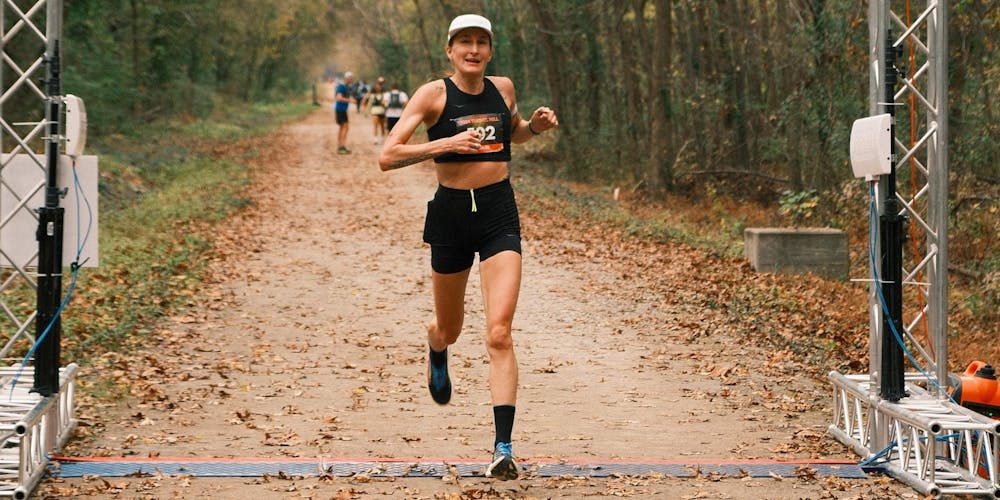In spring 2010, Courtney Olsen became a Western Washington University track and field program record holder in two events: the women's 1,500 meters and the women’s 3,000-meter steeplechase. Now, over a decade later, Olsen has traded the title of “school record holder” for “world record holder,” and she’s not done yet.
Olsen set the 50 mile ultramarathon world record in 5:31:56 at the Tunnel Hill 50 Mile in November and has represented Team USA at the International Association of Ultrarunners 100k World Championships. She is the most decorated member of a small group of Western track and field alums chasing their athletic dreams long after graduation.
“I feel like I'm a unique case that didn't get sponsored till I was in my 30s, and ran faster in my 30s than I did in my teens and 20s,” Olsen said. “I like to share my story, because I feel like there's so many ways to reach a level of success, and you don't have to have it all figured out in a perfect, pretty little youthful timeline.”
90 miles south of Bellingham, in Seattle, Mac Franks is in the process of cultivating his own post-collegiate running career. A sub-four-minute miler and Western’s men’s 1,500 meter school record holder, Franks is looking to build on a strong first season out of college, which saw him set personal bests in the mile and the 3,000 meter steeplechase.
“I'm trying to qualify for USAs (USATF Outdoor Track and Field Championships). That's my main motivation. That's the immediate goal this season,” Franks said.
Like Olsen and Franks, many collegiate athletes graduate with ambitions of continuing to run and compete. Financial backing, community and opportunities, however, can be hard to come by.
After her successful tenure as a Viking, Olsen found herself struggling to find her next step.
“I was in that classic post-collegiate doldrums where you're not good enough to be sponsored or go to a club, like a professional club,” Olsen said. “And so I was lost on what to do with my love of running.”
In an effort to ease the transition as well as build a community of like minded athletes, Olsen moved back to Bellingham after a stint in Boulder, Colo. and started the Bellingham Distance Project (BDP) in 2013. The club began as a women-only group, but has since grown to include a men’s team and a roster of 31 athletes. Olsen’s career took off and she remains the group’s president to this day.
“Courtney is amazingly supportive,” said Haley Stensland, BDP athlete and current Western program record holder in the 1,500 meters. “She’s everyone’s biggest cheerleader.”
For Stensland, who graduated Western in 2015, BDP has meant having an environment that supports her athletic ambitions, a rarity in post-collegiate distance running.
“It’s really nice to have a group of people who are excited about it and want to get together for it,” Stensland said.
After graduating from Western in 2022 and running for a year at NCAA Division I University of North Florida, Franks’ search for opportunity and community brought him back west, where he joined Club Northwest, a Brooks-backed club based in Seattle.
“Having Club Northwest, specifically having that group of people, it mimics the college atmosphere, but it's a lot more unstructured,” Franks said. “I'm taking more responsibility for my own journey … but having people is so clutch. Having guys to work out with, it makes it so much easier.”
For Western’s post-collegiate runners, finding a support structure like BDP or Club Northwest is one thing. Supporting yourself financially and balancing your athletic ambitions with the stresses of everyday life is a much more difficult task.
Olsen has seen it all. From 2020 to 2024 she was sponsored by Hoka, all while also working full time. While the backing of a major shoe company is the dream for most unsponsored athletes, Olsen’s experience shows that even reaching this point offers its own challenges. Communication from Hoka was poor, and Olsen often felt neglected by her sponsor.
“It was weird to be courted and acquired and given things, but then not talked to or counseled. It felt so weird to be desired, but then left alone,” Olsen said. “And maybe that happens often, I don't know, but I don't find it a very helpful relationship to always be second guessing what someone wants from you.”
Olsen’s world record race at Tunnel Hill took place immediately after Hoka notified her that they would be dropping her after her contract ended in December 2024. She is now unsponsored but remains dedicated to her craft, winning the USATF Road 50k Championships on April 12.
For Franks, the meager financial support offered by Club Northwest is certainly not enough to sustain a living, and he too works full time to keep the lights on. However, any day that he can still chase the dream is a good one.
“Running is cool because there's not a lot of sports you can really compete competitively outside of college,” he said. “With running, if you're fast enough, you can get to any meets.”
And for these athletes, a breakthrough might just be one meet away.
Jonah Billings (he/him) is a sports and recreation reporter for The Front. He is a second-year Western student and is majoring in journalism and history. In addition, he is a member of Western’s varsity cross-country and track and field teams. He enjoys running, reading and spending time with friends. You can reach him at jonahbillings.thefront@gmail.com.






